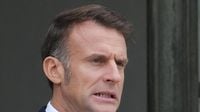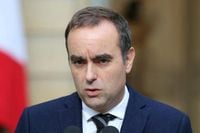PARIS — France is once again at a political crossroads, with President Emmanuel Macron poised to appoint a new prime minister in a dramatic attempt to break a year-long deadlock that has left the country’s government in a state of near-paralysis. The latest crisis comes on the heels of outgoing Prime Minister Sébastien Lecornu’s abrupt resignation, a move that has thrown the government into even deeper uncertainty and sparked renewed calls for Macron himself to step down or dissolve parliament.
Lecornu’s resignation, confirmed on October 6, 2025, capped a turbulent tenure that lasted just 27 days, making his administration the shortest in the history of France’s Fifth Republic. According to AP and The Sun, Lecornu stepped down only hours after unveiling his new cabinet, citing the intransigence of rival political parties as the main reason. “I was ready to compromise, but each political party wanted the other political party to adopt its entire program,” Lecornu declared in a public address, as reported by The Sun. His words echoed the frustration felt across the political spectrum, where deep divisions have made effective governance nearly impossible.
The current stalemate follows Macron’s controversial decision in June 2024 to dissolve the National Assembly and call snap elections. The gamble backfired: while a left-wing coalition emerged as the largest bloc, no party came close to securing a majority in the 577-seat chamber. Macron’s centrist alliance, battered by a surge in far-right support, lost dozens of seats. The result? A hung parliament, a fractured government, and a president with little room to maneuver.
Since then, France has cycled through a dizzying number of prime ministers. Lecornu’s government was the sixth executive in just 20 months, a historic precedent that signals the depth of the crisis. Before Lecornu, François Bayrou lasted 270 days, stepping down after losing a vote of confidence. Michel Barnier, the well-known former EU Brexit negotiator, managed only 99 days before being ousted. As The Sun notes, Macron is now on the verge of appointing his eighth prime minister since 2017—a turnover rate that has left many in France wondering if the office itself is cursed.
The rapid succession of governments has not just been a political spectacle—it’s had real consequences for France’s economy and society. The country faces mounting economic challenges, including a ballooning public debt that reached 3.346 trillion euros (about $3.9 trillion), or 114% of GDP, at the end of the first quarter of 2025. According to AP, France’s poverty rate climbed to 15.4% in 2023, the highest level since records began in 1996. The European Commission and financial markets are growing increasingly anxious, pressing France to rein in spending and comply with EU rules on debt.
Meanwhile, the streets of France have become a stage for ongoing social and political unrest. Millions have participated in strikes and “Block Everything” protests, with trade unions leading the charge against government reforms. The pension reform passed in 2023, which gradually raises the retirement age from 62 to 64, remains a particular flashpoint. Macron fought fiercely for the measure, enacting it into law despite mass protests, but now even this hard-won policy may be in jeopardy. According to AP, the incoming prime minister may be forced to seek compromises or even abandon the pension reform altogether to avoid an immediate vote of no confidence.
The political climate has only grown more toxic as extremist parties increase their influence. Marine Le Pen and Jordan Bardella’s National Rally now holds 123 seats in the National Assembly, making it the largest party in the chamber and a vocal advocate for dissolving parliament. Both political allies and adversaries of Lecornu criticized his cabinet for being either too right-wing or not right-wing enough, reflecting the ideological fault lines that have paralyzed French politics. As The Sun reports, “extremist parties continue to put pressure on France’s governmental establishment.”
In the midst of this chaos, Macron has faced mounting calls for his own resignation. Yet, as IPN and The Sun point out, he remains under no legal obligation to step down. His second term, which runs until 2027, is constitutionally protected, and only a parliamentary vote of no confidence or a decision to dissolve parliament could force an early exit. Outgoing Prime Minister Lecornu, in his final interview with France 2, addressed the growing chorus demanding Macron’s resignation: “Despite the profound political crisis facing France, this is not the appropriate time for such a step.”
For now, Macron is betting that a new prime minister can help break the impasse. On October 8, 2025, the Élysée Palace announced that Macron would appoint a successor within 48 hours, following a final round of consultations with political forces. Lecornu himself was tasked with these last-ditch talks, telling France 2 that “the prospects of dissolution [of the Parliament] are receding and that, in my opinion, the situation allows the president to appoint a prime minister within 48 hours.”
The choice of the next prime minister is fraught with challenges. Macron could turn to a figure from the left, which managed to form a coalition in the 2024 legislative elections, or opt for a technocratic government to sidestep partisan divisions. Either way, the new leader will need to build bridges across a fragmented parliament, seeking compromises to avoid yet another collapse. As Lecornu argued before stepping down, “There’s a majority that can govern. I feel that a path is still possible. It is difficult.”
The stakes are high—not just for Macron’s presidency, but for France’s standing in Europe and beyond. Investors are rattled, voters are frustrated, and the country’s ability to address pressing issues like debt, poverty, and social cohesion hangs in the balance. The repeated collapse of governments, the rise of extremist parties, and the unrelenting protests have all contributed to a sense of drift and uncertainty that is now gripping the nation.
As France waits for Macron’s next move, the question on everyone’s mind is whether this latest appointment will finally bring stability—or simply set the stage for another round of political drama. For now, the country holds its breath, hoping that a new prime minister can chart a path through the turbulence and restore some measure of confidence in France’s battered institutions.





